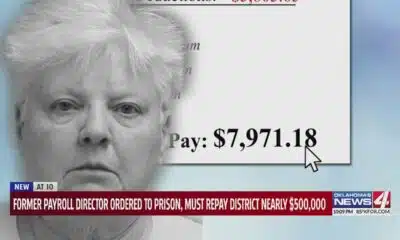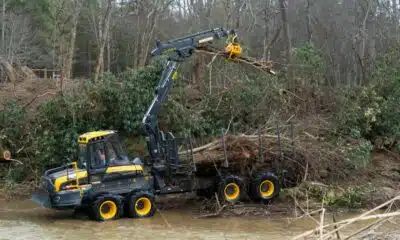News from the South - North Carolina News Feed
People living in tents — a real story, or a pretext for political outrage? • Asheville Watchdog
By now, this story of locals living in flimsy tents post-Helene has taken on a life of its own.
Especially once the frigid temperatures hit last week, the idea of people living in tents in Swannanoa and Fairview, among the hardest hit areas in Buncombe County, really fueled some outrage, both online and among some national media outlets and professional provocateurs.
Buncombe County and FEMA say the stories are inaccurate and overblown, that they have checked on everyone in need and no one is living in a tent who hasn’t chosen to do so.
So where does the truth lie? Are we edging into urban myth territory, or are our neighbors toughing out the coldest temperatures of the year in lightweight tents?
In my opinion, a few people undoubtedly do remain in tents, but they are very few and apparently it’s by choice. And I do feel some in the media or on social media are trying to score political points by bashing FEMA, the federal government, and local leaders.
Last Wednesday I went out to Old U.S. 70 with photographer Starr Sariego, and it didn’t take long to find tents set up on adjoining pieces of property owned by Dara Cody and Joe Bryant. They remain neighbors after the storm, although they’re living in a hotel and a camper right now, respectively, instead of in their homes on the Swannanoa River.
Those homes are gone, swept away by floodwaters.
We found a compound of campers and recreational vehicles, as well as two tents people are living in, and another tent that’s used as a supply tent. Twenty to 30 people are staying on the property at any given time, the property owners and organizers said.
Cody said people definitely were living in tents after Helene, but that’s not the case now.
“We all have either a camper or tiny home, except (one) couple, Lewis and Samantha,” Cody said.

Lewis Arthur and his wife, Samantha Ricks, have taken on a leadership role in organizing the compound, bringing in supplies, and ensuring folks are taken care of. They live in a heated, more heavyweight tent.
“We live by choice — our ministry, and my wife and I — we do that by choice,” Arthur told me. “We’re just nomads, OK? We’re OK living in tents.”
Some are not, and Arthur said people who aren’t used to tent living were indeed forgotten in the immediate weeks after the storm.
Arthur and his wife have been volunteering in Chimney Rock and Burnsville, and they’ve spoken with FEMA contractors and representatives in both places. He feels like other places have gotten federal assistance more quickly, while Swannanoa has been overlooked.
While Arthur maintains that “every single thing” that’s come into the Swannanoa camp has come from Christian organizations, he also understands what FEMA’s main role is.

“They just put the money (out),” Arthur said. “That’s all they are. That’s what I explain to people — FEMA is not gonna come down here with tractors and help clean you up.”
His concern is, “That money isn’t showing — that money is being delayed.”
He says many people have brought in a steady stream of supplies, ranging from fuel and generators to food and gravel.
“That is what FEMA should be doing,” Arthur said, touching on one theme that’s gained traction online — “That you can write checks all you want for all these other countries and wars and other borders, but these people are going to be freezing this winter if we don’t get them in more suitable conditions.”
FEMA and Buncombe County dispute the notion that they’re not doing anything, which I’ll get to in a minute.
Cody said FEMA has been onsite with an inspector.
“And then they sent someone to come out after that, to make sure everyone had spoken to someone from FEMA,” Cody said, noting that she’s been staying in a hotel paid for by FEMA but will move into an RV onsite. “But if you mean come out helping us with anything, no.”
Cody said she’s been in a hotel room for three weeks but has been told she’ll have to be out by Dec. 11. But FEMA announced last week it is extending these hotel stays through the holidays.
I asked Bryant, who also lost his home, vehicle, and possessions in the Sept. 27 flooding, if he’d seen anyone from FEMA.
“What do they look like?” Bryant cracked.
He explained that he has talked to FEMA on multiple occasions at the FEMA Center in Buncombe County, and they did offer him a hotel room. Cody added, “They’ve given that option to almost everybody.”
But Bryant’s offer came with a catch, he says.
“What I was offered was toward Pigeon Forge, and I work every day,” Bryant said. “I’d like to vacation there, but I ain’t got time for that either.”
He says he has not received any money yet from FEMA.
Cody also pointed out that they still don’t have any water or electricity on her property or Bryant’s, other than generators and bottled water.
My takeaway on FEMA is this: Representatives have been to Swannanoa and reached out to people, but those people are frustrated by the bureaucracy and paperwork, and sometimes the lack of a timely response.

What FEMA and Buncombe County say
FEMA’s North Carolina Newsdesk answered multiple questions I sent. FEMA said it’s been working closely with Buncombe County and the state to get disaster recovery information to Helene survivors.
“That includes individuals who are sheltering in tents,” FEMA said. “Last week the county and state led targeted outreach to Barnardsville and Swannanoa areas to make sure those still sheltering in tents were aware of and connected with the various forms of assistance — either through FEMA or other organizations.”
FEMA disaster assistance specialists were available to register anyone who had not already applied for assistance.
“Some said they did not want to register or said they had received assistance and wanted to remain where they were,” FEMA said.
As of Dec. 4, FEMA said 1,520 families from Buncombe County are in the FEMA program that pays for hotel rooms. I had asked specifically about a guy in Swannanoa who was flooded out and staying in a FEMA-paid hotel room and who was told he’d have to be out this week.
Good news on that front.
“At the request of the state of North Carolina, FEMA will be extending the Transitional Sheltering Assistance program past the holiday season,” the FEMA news desk stated. “This extension will continue providing free hotel and motel rooms to more than 5,200 Helene families already checked into area hotels.”
As of Dec. 4, FEMA offered these stats on post-Helene assistance it’s disbursed in North Carolina:
- $263 million approved to 138,000-plus households and individuals beginning their recovery
- $274 million in Public Assistance funding approved to support community recovery
- Travel trailers or manufactured housing units provided by FEMA Direct to 45 households
FEMA continues to operate a Disaster Recovery Center at Asheville Mall. The agency says the quickest way to apply for assistance is at DisasterAssistance.gov or through the FEMA app. You can also call the FEMA Helpline at 800-621-3362. The deadline to apply is Jan. 7.
Ryan Cole, deputy director for emergency management services, addressed concerns about tents at the Buncombe County Helen briefing Thursday.

“Directly after the storm, we did have a lot of people utilizing lightweight tents, and that’s one of the things that we did a canvassing effort for,” Cole said.
“Buncombe County Emergency Services, as well as FEMA staff, have conducted multiple field assessments in several areas to assess the living conditions of displaced residents following Hurricane Helene,” Cole said.
Canvassing focused on Swannanoa, Garren Creek, Fairview, and Barnardsville, and “confirmed that there were no lightweight tents that were being used,” though some canvas tents that have heat are being used in some of the areas.
I asked Cole if there’s anyone in the county staying in a tent now that doesn’t want to be in that tent.
“Absolutely not,” he said.
“They have said that some of those people that are in the lightweight tents, they do not want any assistance,” Cole said. “They were living in lightweight tents before the storm, and they’re continuing to live in those lightweight tents afterwards, because that’s their choice.”
In Swannanoa, Cole said, they found several tents but those are “heavier-weight tents with a heating source.
“But we also found a need for three additional tents — the canvas tents, with a heating source and generator that were supplied in conjunction with the Red Cross to these residents,” Cole said.
In Garren Creek, they identified one person who had been living in a tent but subsequently was provided with a camper. They then used the tent for storage.
“Also, a couple other tents were being utilized to store equipment for people that were utilizing that while they were doing work on their homes,” Cole said. “They were not staying in the tents. A lot of that is what we were seeing in Swannanoa and other areas — where the tents had previously been put up that they may have been using for housing, but were now using for storage.”
The county did not find anyone in Fairview in tents. Some residents in Barnardsville were found in heavyweight tents with heat. The county worked with the Barnardsville Community Center and confirmed that all the residents that needed heated tents had been assisted.
“The one thing that’s important to understand is, even though we may see many things that go across social media, that does not mean that it’s factual, it’s accurate, or it’s true,” Cole said.
He said if you see anyone in a lightweight tent that wants help, you should call the One Buncombe hotline number for assistance at 828-250-6100.
I’m not trying to be an apologist for FEMA or the county. Especially early on after the disaster, help was slow in some cases.
But it’s also clear the county and FEMA have made extensive efforts to reach out to people and provide help.
Some of the frustration is because of the bureaucracy, which can be hard for folks to navigate. For instance, Cody said she was told she was getting a FEMA trailer but then a different worker said no, after a long hold on the phone.
A mistake on her registration and paperwork threw a wrench in her FEMA trailer, but she does have an RV on site she can live in.
Another frustrating experience with FEMA
Plenty of those who endured Helene’s floodwaters remain frustrated with the response. That includes Ben Larrabee, who was living in a single-wide rental trailer next to the river in Swannanoa on Sept. 27.
The water breached his home and toppled several of its cinder-block foundation pillars, but just as he was preparing to swim for it, the waters started receding. Two people in the trailer next door drowned.

Larrabee moved to Asheville from Hickory early this year to work for a landscaping business. That did not work out, and he’s now working in the life insurance field.
Immediately after Helene, Larrabee stayed at the emergency shelter at the WNC Agricultural Center for about 10 days. FEMA then started paying for Larrabee to stay in a hotel for several weeks.
“I was in Hickory for like a week and a half or something, until finally the voucher came through for the hotel, then I was able to try to look for hotels,” Larrabee said. “But that took forever. It took several days or a week before I could even find a hotel that would take me.”
Early last week he was worried about that stay running out, but then two days before he was supposed to leave he found out about the FEMA extension that will allow him to stay at least into early January.
Larrabee says he’s received about $8,000 from FEMA, which he does appreciate. But he’s also had to buy a car to replace his Dodge Charger that got swept away, and he’s spending more than usual on food because he has to eat out a lot.
Add in searching for an apartment in a market where even a one-bedroom can go for $1,400 or more, and Larrabee, 42, has been in what he calls a “constant state of wondering and anxiety.”
He’d like to see better communications out of FEMA, and a lot less bureaucracy to access the funds.
More than two months after Helene devastated our area, we still have so much rebuilding to do, and so many people remain in need. People at the makeshift camp in Swannanoa need fuel, generators and heaters, and obviously, restored running water and grid electricity. Larrabee needs an affordable place to live.
Reach out to me if you’d like to help, and I’ll connect you with these folks.
In the meantime, let’s remember that we still have a long, hard road ahead of us, and all of us — whether in government or private citizens — need to keep looking out for one another.
Asheville Watchdog is a nonprofit news team producing stories that matter to Asheville and Buncombe County. John Boyle has been covering Asheville and surrounding communities since the 20th century. You can reach him at (828) 337-0941, or via email at jboyle@avlwatchdog.org. The Watchdog’s local reporting during this crisis is made possible by donations from the community. To show your support for this vital public service go to avlwatchdog.org/support-our-publication/.
Related
The post People living in tents — a real story, or a pretext for political outrage? • Asheville Watchdog appeared first on avlwatchdog.org
News from the South - North Carolina News Feed
In Depth with Dan: Answering viewer questions about flesh-eating bacteria, digital licenses
SUMMARY: In this Monday mailbag, Dan addresses viewer questions on three topics. First, North Carolina’s Vibrio bacteria risk in summer coastal waters: cooked shellfish is safe, but raw consumption is risky due to bacteria concentrating in oysters. Second, digital driver’s licenses in North Carolina face delays; although legalized in 2023, full rollout may not occur until 2026, with other states also lagging behind. Lastly, Dan explains flood-damaged vehicles after recent storms: flooded cars must be branded as such, but scams occur. He shares tips to spot flood damage when buying used cars, emphasizing caution and thorough inspection.
WRAL anchor/reporter Dan Haggerty answered viewer questions about a flesh-eating bacteria in North Carolina and the legalization of digital driver’s licenses.
News from the South - North Carolina News Feed
The latest update on Tropical Storm Erin
SUMMARY: Tropical Storm Erin is forecast to become a Category 1 hurricane by Thursday and remain well out to sea through Saturday, near the Lesser Antilles northeast of Puerto Rico. Models show it moving west, then curving north toward Bermuda or Florida, but uncertainty remains high beyond next week. The American and European models suggest it could pass between Bermuda and Hatteras, causing higher surf midweek. Due to large forecast errors, the storm’s exact path is unclear, ranging from north of New York to the Florida panhandle. Residents should prepare hurricane kits and stay updated, with clearer guidance expected by Thursday or Friday.
Will Erin cause problems for the East Coast? Here’s the latest on Monday evening.
https://abc11.com/post/tracking-tropics-tropical-storm-erin-forms-eastern-tropical-atlantic-cabo-verde-islands/17499988/
Download: https://abc11.com/apps/
Like us on Facebook: https://www.facebook.com/ABC11/
Instagram: https://www.instagram.com/abc11_wtvd/
Threads: https://www.threads.net/@abc11_wtvd
TIKTOK: https://www.tiktok.com/@abc11_eyewitnessnews
X: https://x.com/ABC11_WTVD
News from the South - North Carolina News Feed
Body of missing NC teen found in Florida, family says
SUMMARY: The body of missing North Carolina teen Gio Gio was found in Bradenton, Florida, confirmed by his family. Originally, Gio Gio was supposed to be picked up by relatives after meeting cousins in Florida, but he disappeared after texting his mother for help. His family’s private investigators, not the police, discovered his body near I-75 after police had initially searched the area. Gio Gio’s mother expressed her heartbreak on Facebook, calling it every parent’s worst nightmare. The investigation continues, focusing on the timeline after Gio Gio entered the car with his cousins. An autopsy is pending, with no immediate signs of foul play.
The body of Giovanni Pelletier was found in a retention pond, authorities said, and his mom is living “every parent’s worst nightmare.”
https://abc11.com/post/giovanni-pelletier-body-missing-18-year-old-north-carolina-found-pond-where-last-seen-family-says/17483056/
Download: https://abc11.com/apps/
Like us on Facebook: https://www.facebook.com/ABC11/
Instagram: https://www.instagram.com/abc11_wtvd/
Threads: https://www.threads.net/@abc11_wtvd
TIKTOK: https://www.tiktok.com/@abc11_eyewitnessnews
X: https://x.com/ABC11_WTVD
-
News from the South - Oklahoma News Feed3 days ago
Former payroll director ordered to prison, must repay district nearly $500,000
-
News from the South - North Carolina News Feed6 days ago
Two people unaccounted for in Spring Lake after flash flooding
-
News from the South - Texas News Feed4 days ago
Jim Lovell, Apollo 13 moon mission leader, dies at 97
-
News from the South - Tennessee News Feed5 days ago
Trump’s new tariffs take effect. Here’s how Tennesseans could be impacted
-
News from the South - Missouri News Feed4 days ago
Man accused of running over Kansas City teacher with car before shooting, killing her
-
News from the South - Oklahoma News Feed6 days ago
Tulsa, OKC Resort to Hostile Architecture to Deter Homeless Encampments
-
News from the South - North Carolina News Feed5 days ago
Asheville’s Urban Forestry Commission speaks for the city’s trees. It hasn’t met since Helene. • Asheville Watchdog
-
News from the South - Louisiana News Feed6 days ago
Drugs, stolen vehicles and illegal firearms allegedly found in Slidell home









































